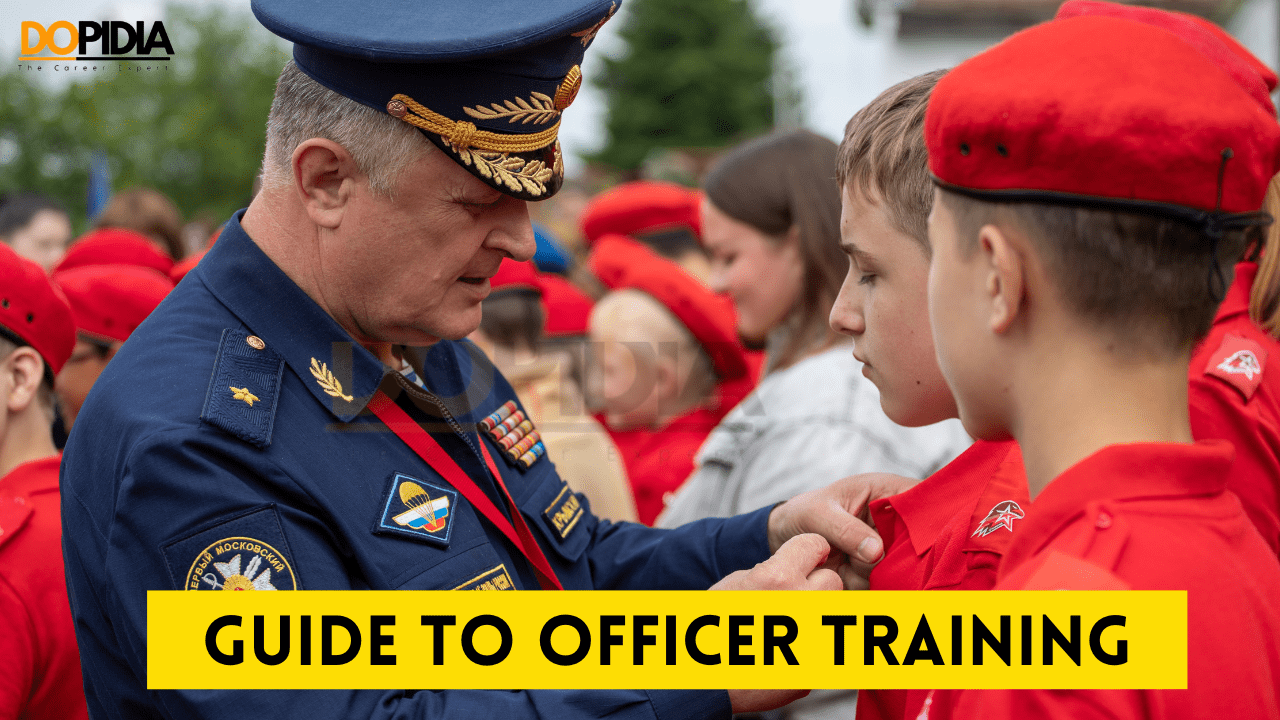Guide to Officer Training
Do you want to work within the Swedish Armed Forces? Then the officer training might be something for you. In this article, we will go through how you can train to become an officer, what the profession of an officer entails, and what roles you can work in.
Please note that none of the companies, institutions, or organizations mentioned in this article are affiliated with Indeed.
This article is based on information available at the time of writing. As information can change at any time, Indeed cannot guarantee its ongoing accuracy. Please consult local sources to find out the latest on the subject.
Train to become an officer
As an officer in the Swedish Armed Forces, you have many different career opportunities. You can choose to train as an officer, specialist officer, or reserve officer depending on whether you want to work as an officer full-time or part-time.
For those who wish to work within the Swedish Armed Forces, there are two training options to become an officer. You can either train to become an officer through the Officer Program at the Military Academy Karlberg in Stockholm, or you can choose to pursue the Specialist Officer Training at one of the various Defense Force schools located across the country.
Officer Training in the Officer Program
The Officer Program is a three-year, 180-credit academic education that leads to a professional degree as an officer. The program is conducted by the Swedish Defence University, and the majority of studies take place at the Military Academy Karlberg in Stockholm.
In the Officer Program, theory is combined with practical elements such as physical training, field exercises, and leadership and command training. Your main responsibility as an officer is to lead military operations, and the Officer Program provides you with the tactical knowledge required to develop strategies and carry out military operations.
Throughout the training, you will develop your leadership qualities and your ability to make quick decisions in all types of situations. It is a physically and intellectually challenging education. In the Officer Program, you can choose from three different specializations:
- Officer Program with a focus on Military Science
- Officer Program with a focus on Military Technology
- Officer Program with a focus on Nautical Science.
The first three terms are conducted at the Swedish Defence University’s Campus Karlberg in Stockholm. The fourth and fifth terms consist of specialization and workplace-based education (WBE) within the Swedish Armed Forces. During this phase, you delve deeper into the specialization you chose during the second term. All programs lead to a professional degree as an officer.
Officer Program with a Focus on Military Science
This specialization prepares you to become an officer in the Army, Air Force, or Navy. The goal is for you to be able to lead combat units.
You will study war, warfare, and how to utilize military resources in various types of military operations. You will learn a lot about tactics and strategy, ranging from unit to brigade level. It is a comprehensive education, and you can also become an operator or hold a position within units such as command units, logistics units, or security units.
The workplace-based education offers ten specializations, where you can choose from the following:
Specializations within the Officer Program
Amphibious
Amphibious units can operate in all types of terrain. While their natural combat environment is in zones near the coast, river deltas, and other amphibious areas, amphibious units, with their various vehicles and weapon systems, can carry out operations both above and below the water surface, in the air, and on land.
CBRN
CBRN officers work to protect people from biological and chemical warfare agents, nuclear weapons, and radioactivity. CBRN stands for chemical, biological, radiological, and nuclear threats and risks. The work may involve stopping infectious disease outbreaks or detecting and identifying biological and chemical substances.
Field Operations
Officers specialized in field operations lead engineering units. They make it difficult for the enemy to advance in terrain while also making it easier for their own units. Tasks such as mine clearance and ammunition disposal fall under field operations.
Supply and Logistics
Officers specialized in supply and logistics ensure that the unit has access to everything from food and water to ammunition, fuel, and everything else the unit needs.
Indirect Combat
Officers specialized in indirect combat work to engage targets that cannot be seen from the firing position. They may also lead artillery units and learn how to operate artillery.
Command and Control
Systems As a command and control officer, you work on leading field operations and training others in the command and control systems needed to lead and coordinate unit efforts. You will also learn how various communication and information systems function.
Related Topic: HOW TO BE LESS NERVOUS ABOUT A NEW JOB
Air Defense
Air defense protects the population against airborne attacks. Air defense officers track aircraft using radar, identify both friendly and hostile aircraft, and practice shooting down hostile aircraft.
Ground Combat
Officers specializing in ground combat attack, capture and defend important areas. Officers focused on ground combat can work almost anywhere, but they are often in demand within mechanized infantry units and armored units.
STRIL
STRIL stands for command and control and air surveillance. As a STRIL officer, you work as an air surveillance operator, providing information about the aerial situation and any violations of Swedish airspace. This information forms the basis for decisions regarding the defense of Sweden’s borders.
Security Units
As an officer in a security unit, your task is to protect strategically important military targets against attacks from hostile special forces.
Officer Program with a Focus on Military Technology
The specialization in military technology provides you with a deeper understanding of how technical and social competencies influence military operations. It involves being able to address threats and knowing what to do to eliminate a threat using techniques other than weaponry. The main subject in military technology is defense systems.
The workplace-based education within military technology offers six specializations, and you can choose from the following:
Military Technology at the Swedish Defence Materiel Administration (FMV) This specialization is available for both the Air Force and the Army. Here, you will learn about advanced technical systems within the Swedish Armed Forces and how to use them in military operations. You will also learn how to ensure availability and sustainability for the units.
Indirect Combat
The specialization in indirect combat involves learning how to engage a target that you cannot see. You will also learn how to lead an artillery unit and operate artillery.
Air Defense
As an officer in an air defense unit, you protect the population, airbases, and military units from airborne attacks. You will learn how to locate both friendly and hostile aircraft using radar and how to shoot down hostile aircraft.
Field Operations
In this specialization, you will learn how to modify the terrain to impede enemy movement while facilitating your own unit’s operations. Examples of field operations include mine clearance and ammunition disposal.
CBRN
Officers specializing in CBRN protect people from biological and chemical warfare agents, nuclear weapons, and radioactivity. The work of a CBRN officer involves identifying and assessing biological and chemical substances that pose a threat to the population. The work may also involve countering infectious diseases.
Command and Control
Systems As an officer specializing in command and control systems, you will educate and lead work related to all communication and information systems, including data systems, radio systems, and power supply. You enable the unit commander to lead the unit and coordinate with other units.
Officer Program with a Focus on Nautical Science
This specialization prepares you for service in the Navy, either in submarine or naval combat flotillas. The curriculum includes studies in maritime regulations, naval leadership, and maritime communication, with a main focus on military science. You will also learn navigation and how to calculate the effects of weather and wind on the ship.
After completing the education, as an officer with a specialization in nautical science, you can be employed within the defense at a naval unit, where you may serve as a ship commander in the Navy. It’s not uncommon for nautical studies to continue after completing the officer program, but in the capacity of a defense employee.
Specialist Officer Training
The Specialist Officer Training is a 1.5-year program that you can undertake at one of the various Defense Force schools across the country. You can choose from 12 different specializations. The education consists of standalone courses where theory is combined with practical training.
As a specialist officer, you are responsible for the military core competencies. You will further develop your professional skills and become an expert in your field. Specialist officers also oversee the training and preparation of sailors, soldiers, and group leaders to enable their participation and performance in combat.
Eligibility for the Officer Program and Specialist Officer Training
To enroll in the Officer Program or Specialist Officer Training, basic eligibility is required. Additional requirements for these programs include completing conscription or the nine-month basic training. You must be a Swedish citizen and undergo a suitability assessment.
For those interested in the Officer Program, the following eligibility criteria apply:
- Swedish citizenship
- Mathematics B and Social Studies A, or equivalent
- Approved results from military basic training
- Approved tests by the Recruitment Authority
- Security clearance approval.
For those interested in Specialist Officer Training, the following eligibility criteria apply:
- Swedish citizenship or dual citizenship
- Basic eligibility for higher education studies from high school or equivalent adult education
- Physical and mental fitness suitable for the specialization
- Approved security clearance and background check.
Roles of Officers
Most officers are active within the Swedish Armed Forces operational organization. They may hold leadership roles in various military units within the Army, Air Force, or Navy. There are numerous career opportunities for officers in the Swedish Armed Forces.
Officers typically have leadership roles, and their responsibilities include ensuring that commanders, soldiers, and sailors receive the appropriate training for military operations. Officers may also work in more office-related areas such as marketing within the Swedish Armed Forces.
An officer’s workplace within the Swedish Armed Forces can vary from office work to activities ranging from tent accommodations in Sweden or abroad, to being stationed on a ship, depending on the type of training.
You can also work as a reserve officer. As a reserve officer, your primary occupation is not within the Swedish Armed Forces, but you have an indefinite employment with them. Reserve officers receive the same unique officer training and practical leadership experience as regular officers and specialist officers. These skills are valued by employers and can also be advantageous in your civilian career.
What does it mean to be an officer?
Being an officer is a diverse profession where you, as a leader, need to be confident in your role. You should be a good role model, possess excellent teamwork skills, and be an effective leader. You should be capable of making quick decisions and adept at problem-solving.
Working as an officer can also be demanding, as part of the job involves physical training in combat environments, where both your own and others’ lives may be at risk.
In addition to the physical demands, the role can also be mentally taxing. As an officer, you are responsible not only for yourself but also for the well-being of others.



